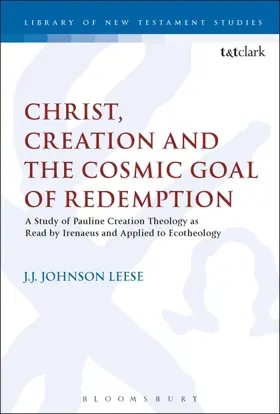

Christ, Creation and the Cosmic Goal of Redemption: A Study of Pauline Creation Theology as Read by Irenaeus and Applied to Ecotheology
in Library of New Testament Studies
Pages
224
Publisher
T&T Clark
Published
2018
ISBN-13
9780567678072
The act of martyrdom in the worldview of the Apocalypse has been considered to be an exemplification of non-violent resistance. Paul Middleton argues here, however, that it is in fact a representation of direct participation by Christians, through their martyrdom, in divine violence against those the author of Revelation portrays as God's enemies. Middleton shows that acceptance of martyrdom is to grasp the invitation to participate in the Revelation's divine violence. Martyrs follow the model laid down by the Lamb, who was not only slain, but resurrected, glorified, and who executes judgement.
The world created by the Apocalypse encourages readers to conquer the Beast through martyrdom, but also through the experience of resurrection and being appointed judges. In this role, martyrs participate in the judgement of the wicked by sharing the Lamb's power to judge. Different from eschewing violence, the conceptual world of the Apocalypse portrays God, the Lamb, and the martyrs as possessing more power, might, and violent potential than the Emperor and his armies. Middleton believes that martyrdom and violence are necessary components of the worldview of Revelation.Table of contents
How can ancient texts speak wisdom into the pressing issues of today? J.J. Johnson Leese shows that the apostle Paul's writing about Christ's relationship to creation read alongside the astute interpretation of these texts by Irenaeus of Lyon can provide a meaningful contribution to the contemporary ecotheological conversation.
Leese draws upon the integration of three related scholarly trends – the increased importance placed on biblical creation themes, the emergence of ecotheology, and the history of reception – while focusing on the Pauline corpus and readings of Paul by Irenaeus to uncover a robust creation and ecotheological theology. Leese shows how Irenaeus' creation theology was constructed through connecting and organizing biblical creation texts into a Christological framework. Irenaeus' approach provides possibilities for Paul to contribute to ecotheology, not as a set of unconnected proof texts, but by way of a theological vision where the whole of reality in relationship to Christ and creation and by extension, to soteriology and ecclesiology, are central components of Paul's theology.
The world created by the Apocalypse encourages readers to conquer the Beast through martyrdom, but also through the experience of resurrection and being appointed judges. In this role, martyrs participate in the judgement of the wicked by sharing the Lamb's power to judge. Different from eschewing violence, the conceptual world of the Apocalypse portrays God, the Lamb, and the martyrs as possessing more power, might, and violent potential than the Emperor and his armies. Middleton believes that martyrdom and violence are necessary components of the worldview of Revelation.
Leese draws upon the integration of three related scholarly trends – the increased importance placed on biblical creation themes, the emergence of ecotheology, and the history of reception – while focusing on the Pauline corpus and readings of Paul by Irenaeus to uncover a robust creation and ecotheological theology. Leese shows how Irenaeus' creation theology was constructed through connecting and organizing biblical creation texts into a Christological framework. Irenaeus' approach provides possibilities for Paul to contribute to ecotheology, not as a set of unconnected proof texts, but by way of a theological vision where the whole of reality in relationship to Christ and creation and by extension, to soteriology and ecclesiology, are central components of Paul's theology.
- Table of contents
- Acknowledgements
- Abbreviations
- Chapter One: Introduction and Background to Study
- Chapter Two: Christ of the New Creation
- Chapter Three: Christ of The Beginning and End
- Chapter Four: Christ as Image of God and Adam
- Chapter Five: Irenaeus of Lyons, Theologian of Creation
- Chapter Six: Irenaeus and Paul
- Chapter Seven: Paul, Irenaeus, and Ecotheology – Possibilities for Consideration
- Bibliography